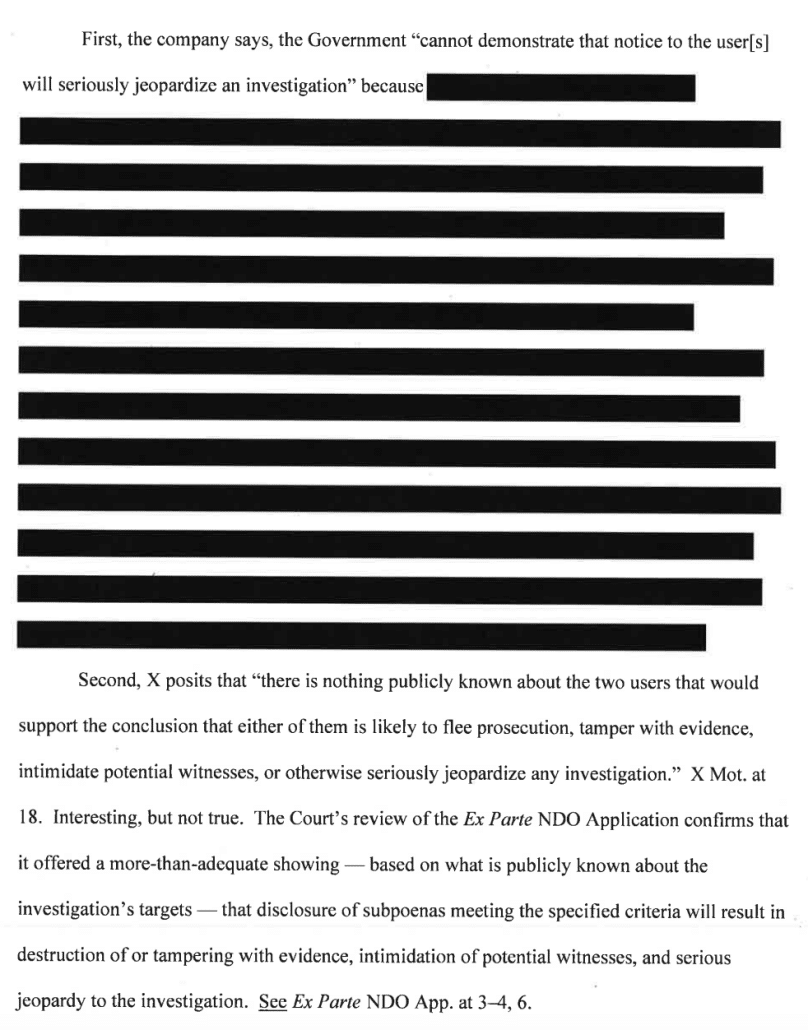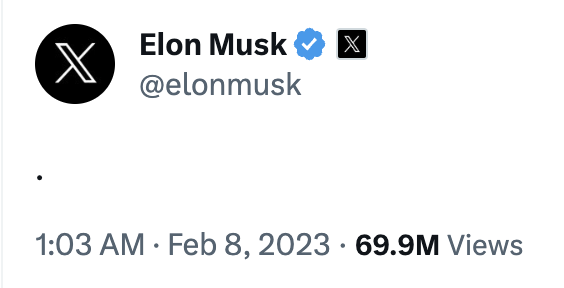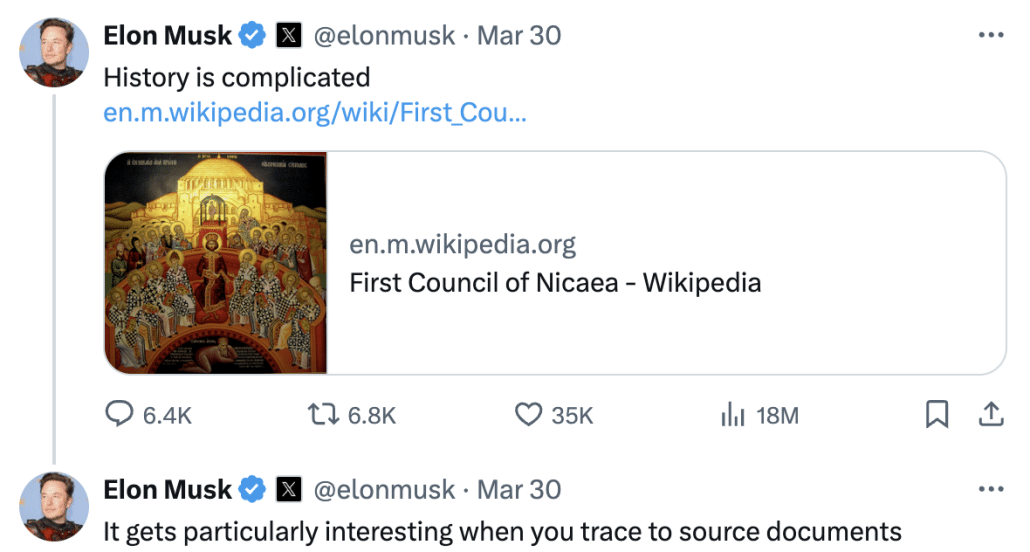On Friday, DC Chief Judge James Boasberg released a redacted version of a March 29 opinion on another attempt by Xitter to refuse compliance with legal process based on a complaint about a gag order (formally, a non-disclosure order, referred to as an NDO below). Kyle Cheney, who first posted on it and who tends to have a good read on these things, noted that it seems important.
As you recall, Xitter successfully delayed Jack Smith’s access to Trump’s Xitter account for 23 days in January and February of last year (from when then-Chief Judge Beryl Howell approved the warrant on January 17 until when Xitter finally complied on February 9), then spent several more months arguing that it should be able to inform Trump they had provided the information and should not have to pay fines for being in contempt.
This time around, Xitter delayed DOJ’s access to the mere subscriber records — that is, records showing who owns the accounts in question — for two Xitter accounts for over two months (January 25 through March 29 of this year) based on a similar complaint: that before it complied, it should be able to tell the subjects of the criminal investigation about the request.
While (as Cheney noted) there’s no clear tie to Trump, this investigation is focused on public figures of some sort. We know that because Xitter argued that notifying the targets would not harm the investigation, and then claimed there was nothing publicly known about the targets to suggest informing them would lead to witness intimidation or any of the other bases DOJ provided for delaying notice for a year.
Judge Boasberg debunked Xitter’s claim. There was information in the affidavit, he said, even just “based on what is publicly known about the investigation’s targets,” to show that disclosure might result in witness intimidation. Xitter also complained that the government offered more information to justify its gag after Xitter challenged it, but Boasberg declined to “infer” from that the initial basis was lacking.
And while there’s no reason to believe that those public people have a tie to Trump, Boasberg cited last year’s legal dispute in three places to justify denying Xitter’s demand.
He invoked Yogi Berra (and the government’s filings) to explain why Xitter’s “imagined categorical prohibition on omnibus NDOs” was little different than the arguments it made last year.
On that question, much of X’s argumentation may be characterized by Yogi Berra’s immortal line, “It’s déjà vu all over again.” That is because the company mostly regurgitates the arguments that it made — which both this Court’s predecessor and the D.C. Circuit rejected — just last year in a case involving the same parties. See In re Sealed Case, 77 F. 4th 815, aff’g in the Matter of the Search; see also Redacted Gov’t Mot. at 13 (asserting that X “knows [its arguments] are losing arguments — having just had the D.C. Circuit reject them last year when it challenged a different NDO”); see also id., at 1, 7-8. The NDO at issue in In re Sealed Case accompanied a search warrant directing Twitter to produce information related to former President Trump’s account. See 77 F.4th at 821. Twitter challenged the NDO on much the same grounds as it does here, and the Circuit did not bite.
Boasberg likened Xitter’s glib offer to tell only the subjects of the investigation to Xitter’s similar offer last year to tell only Trump, which the DC Circuit rejected.
The company believes that “[a] less restrictive means of furthering the government’s interests . . . would be to permit X to disclose the Subpoena’s existence to the targeted users, while prohibiting disclosure . . . to anyone else.” Id. at 24. That is akin to asking for the donut minus the hole.
Indeed, the Circuit rejected an analogous alternative in In re Sealed Case. There, the company proposed notifying just Trump–the target of the warrant that the challenged NDO accompanied–of the warrant’s existence. Yet the Circuit considered that alternative a “nonstarter[]” because it “would not have maintained the confidentiality of the criminal investigation and therefore risked jeopardizing it.” In re Sealed Case. 77 F.4th at 831. Nor would it have safeguarded the security and integrity of the investigation, as the whole point of the nondisclosure was to avoid tipping off the former President about the warrant’s existence.” Id. at 832. X’s proposal here falls flat for precisely the same reason: permitting it to disclose the subpoena’s existence [redacted] would neither protect the investigation’s confidentiality nor safeguard its integrity. See Redacted Gov’t Mot. at 12 n.4.
[Paragraph redacted]
Notably, last year Xitter at least relied on a purported interest in preserving Executive Privilege. Here, there’s no such claim; just a specious argument that DOJ should have to get individualized NDOs for every subpoena it submits in this investigation, even if all of them ask for no more than basic social media account information. So this is not some protected class, like a member of Congress or staffer.
Perhaps Boasberg’s most interesting invocation of Xitter’s earlier attempt to tamper in the Trump investigation is where, in almost entirely redacted language, he compares the urgency of this investigation with that of Jack Smith’s investigation into, “activity intended to alter the outcome of a valid national election for the leadership of the Executive Branch of the federal government.”
He spends three (redacted) paragraphs describing the import of the investigation.
To be sure, the Government’s interest in In re Sealed Case “was particularly strong” because of the goal of the investigation at issue: “[T]o ferret out activity intended to alter the outcome of a valid national election for the leadership of the Executive Branch of the federal government . . . and to assess whether that activity crossed lines into criminal culpability.” In re Sealed Case. 77 F4th at 830. The United States does not purport to target election interference in this case. But it submits that its interest are nevertheless heightened here for another reason: [1.5 lines redacted] The Court wholly agrees based on the evidence outlined in the Government’s ex parte briefing. [3 paragraphs redacted]
Whether or not this has a direct tie to Trump, it’s worth noting that Musk met with Trump (on March 2) during the pendency of this fight; last year, Musk met with Jim Jordan twice during Xitter’s challenge to the Trump warrant.
Whatever that three paragraph description was, Boasberg described the type of investigation using a short word — four or maybe five characters. This could be a FARA investigation or a leak investigation, for example, or perhaps he cited code to describe it.
Update: I guess I should explain why I used Musk’s Council of Nicea tweets as my featured image? In this post (linked above), I noted that on the day Xitter started complying with the Trump warrant, Musk posted this tweet:
So I went to Musk’s tweets from the day after Boasberg’s order and noted that he tweeted obliquely about “trac[ing] to source documents.”
If this is a leak investigation, it could be a reference to an attempt to source a leak.
Timeline
December 11, 2023: Application for omnibus NDO
January 5, 2024: DOJ serves Xitter with subpoena for subscriber information
January 24: Xitter moves to vacate the NDO, review the affidavit, and stay compliance
January 25: Initial deadline for compliance
March 2: Musk meets with Trump in Florida
March 29: Boasberg orders Xitter to comply
April 12: Boasberg released redacted opinion


